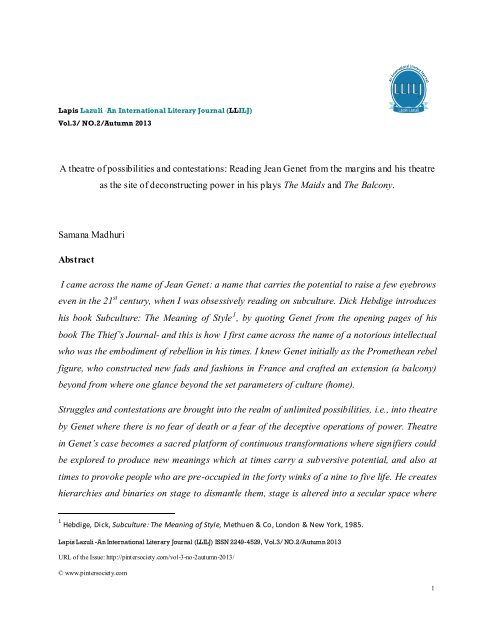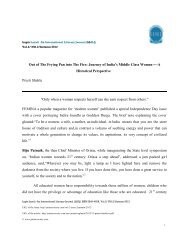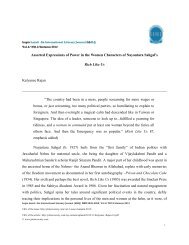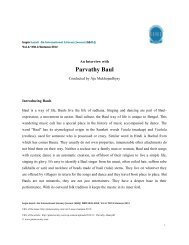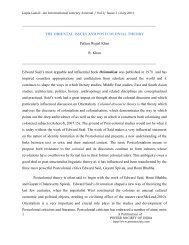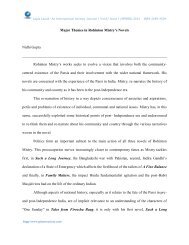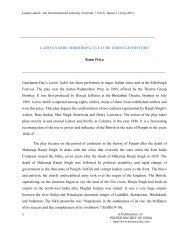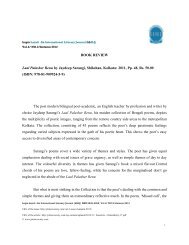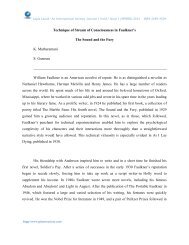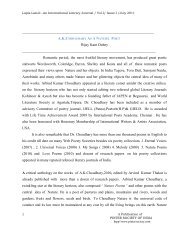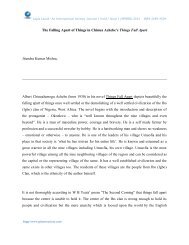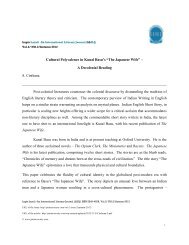A theatre of possibilities and contestations: Reading ... - lapis lazuli
A theatre of possibilities and contestations: Reading ... - lapis lazuli
A theatre of possibilities and contestations: Reading ... - lapis lazuli
Create successful ePaper yourself
Turn your PDF publications into a flip-book with our unique Google optimized e-Paper software.
A <strong>theatre</strong> <strong>of</strong> <strong>possibilities</strong> <strong>and</strong> <strong>contestations</strong>: <strong>Reading</strong> Jean Genet from the margins <strong>and</strong> his <strong>theatre</strong> as thesite <strong>of</strong> deconstructing power in his plays The Maids <strong>and</strong> The Balcony.object transgresses the boundaries <strong>and</strong> attains its subjectivity to become “other”. Genet’swritings have been deconstructed by partaking various perspectives but not much research hadbeen taken up to look at Genet’s plays from a post-facto reading <strong>of</strong> Genet works as the voice <strong>of</strong>discontent <strong>and</strong> a spatially displaced icon <strong>of</strong> rebellion <strong>of</strong> the 60’s.My paper would try <strong>and</strong> elaborate on Genet’s approach to writing keeping in mind hismarginalized position both as a public ward, as a thief <strong>and</strong> a homosexual wherein he exploresthe inert possibility <strong>of</strong> transforming even crime into art. The operations <strong>of</strong> power in the realms <strong>of</strong>gender, class etc are fractured by Genet’s conscious use <strong>of</strong> methods like cross-dressing, roleplaying etc. In his plays like The Balcony <strong>and</strong> The Maids he juxtaposes <strong>and</strong> complementsbinaries like reality <strong>and</strong> imagination to shock <strong>and</strong> awe the audience.Power is not an institution, <strong>and</strong> not a structure; neither is it a certain strength we areendowed with; it is the name that one attributes to a complex strategical situation in aparticular society i .-Michel FoucaultRevolutions are not always simultaneous in the fields <strong>of</strong> arts, literature <strong>and</strong> politics.It sometimes happens that political <strong>and</strong> social revolutions retain, when they obtainpower, that which was most academic in the culture or civilization, they have alreadydisplaced…The man who has made the biggest contribution to the liberation <strong>of</strong>homosexuals is, I think, a man who was not liberated in any way <strong>and</strong> certainlywasn‟t homosexual, that‟s Freud…He did it by unveiling the pansexuality <strong>and</strong>eroticism which is at the basis <strong>of</strong> all sexuality, <strong>and</strong> by showing the lack <strong>of</strong>differentiation in sexuality, or sexuality, or bisexuality, <strong>of</strong> children ii .2
Lapis Lazuli -An International Literary Journal (LLILJ)-Jean Genet“I knew Genet before I knew Genet”. Perhaps, this is the most absurd introductory statement thata paper could initiate in order to put forth any argument, but alas! I could not think <strong>of</strong> a betteralternative.I came across the name <strong>of</strong> Jean Genet (1910-1986): a name that carries the potential to raise afew eyebrows even in the 21 st century, when I was obsessively reading on subculture. DickHebdige introduces his book Subculture: The Meaning <strong>of</strong> Style iii , by quoting Genet from theopening pages <strong>of</strong> his book The Thief’s Journal- <strong>and</strong> this is how I first came across the name <strong>of</strong> anotorious intellectual who was the embodiment <strong>of</strong> rebellion in his times <strong>and</strong> who is till daterevered in the present times not by intellectuals as well as iconoclasts. Through my readings Iwas initially introduced to Genet as the Promethean rebel figure, who constructed new fads <strong>and</strong>fashions in France <strong>and</strong> crafted an extension (a balcony) beyond from where one glance beyondthe set parameters <strong>of</strong> culture (home). But with time I realized his potential as a playwright,novelist, a poet <strong>and</strong> above all a man who understood his position <strong>and</strong> fought for his rights <strong>and</strong>what he ardently believed to be right. And it is these struggles <strong>and</strong> <strong>contestations</strong> that hecontinuously strived for are brought into the realm <strong>of</strong> unlimited <strong>possibilities</strong>, i.e., into <strong>theatre</strong> byGenet where there is no fear <strong>of</strong> death or a fear <strong>of</strong> the deceptive operations <strong>of</strong> power.Theatre in Genet‟s case becomes a sacred platform <strong>of</strong> continuous transformations wheresignifiers could be explored to produce new meanings which at times carry a subversivepotential, <strong>and</strong> also at times to provoke people who are pre-occupied in the forty winks <strong>of</strong> a nineto five life. He creates hierarchies <strong>and</strong> binaries on stage to dismantle them, stage is altered into asecular space where object transgresses the boundaries <strong>and</strong> attains its subjectivity to become“other”. Genet‟s writings have been deconstructed by partaking various perspectives but notmuch research had been taken up to look at Genet‟s plays from a post-facto reading <strong>of</strong> Genetworks as the voice <strong>of</strong> discontent <strong>and</strong> a spatially displaced icon <strong>of</strong> rebellion <strong>of</strong> the 60‟s.What were 60‟s all about? This question is countered by the immediate response from mostpeople as an era <strong>of</strong> rebellion, sexual promiscuity, defiance <strong>of</strong> existing codes, protest againstatrocities like Vietnam War etc. But if we probe a little bit deeper into the “apparently” most3
Lapis Lazuli -An International Literary Journal (LLILJ)that cultural whiteness didn‟t completely capture their reality…Negro role modelswas a small price to pay, because at some level they understood that despite theirwhite skin, they had more in common with the black kids…Not that they werepolitically conscious liberals, touched by the spirit <strong>of</strong> brotherhood…these white kidswith the look <strong>of</strong> the streets shared something more organic with their fashionmentors than progressive political rhetoric at the putative dawn <strong>of</strong> the Age <strong>of</strong>Aquarius. vLike this entire movement that was initiated by individuals who were the object <strong>of</strong>discrimination, economically, racially etc., <strong>and</strong> formed an alternative mode <strong>of</strong> living. Genet <strong>and</strong>his writings could be read keeping in mind his marginalized position both as a public ward, as athief <strong>and</strong> a homosexual. To a large extent his writings are an answer to the systematicallycategorized society <strong>and</strong> also a medium <strong>of</strong> his liberation, as well as for the audience who iswatching his plays where he explores the inert possibility <strong>of</strong> transforming even crime into art.The operations <strong>of</strong> power in the realms <strong>of</strong> gender, class etc are fractured by Genet‟s conscious use<strong>of</strong> methods like cross-dressing, role playing etc. In his plays like The Balcony <strong>and</strong> The Maids hejuxtaposes <strong>and</strong> complements binaries like reality <strong>and</strong> imagination to shock <strong>and</strong> awe the audience.The mimicked reality decodes power relations existent in real life on the stage. The operation <strong>of</strong>ideological structures beyond the consciousness is manifested on stage through charactersdeprived <strong>of</strong> subjectivity. Maids, prostitutes, outlaws are released from the perpetual vigilance <strong>of</strong>the dominating power structures on stage in his plays. The stage in this case does not try tomimic reality or recreate the realist setting; quite contrarily it becomes a space <strong>of</strong> heightenedexcesses. The stage directions <strong>and</strong> the props in the play Balcony in fact act as an introduction toboth the style as well as various kinds <strong>of</strong> exaggeration that would be h<strong>and</strong>led in different waysthrough out the performance <strong>of</strong> the play to break hierarchies‟ <strong>and</strong> illusions which are a product <strong>of</strong>it.The set seems to represent sacristy, formed by three blood-red, cloth folding-screens.The one at the rear has a built-in door. Above, a huge Spanish crucifix … THE5
A <strong>theatre</strong> <strong>of</strong> <strong>possibilities</strong> <strong>and</strong> <strong>contestations</strong>: <strong>Reading</strong> Jean Genet from the margins <strong>and</strong> his <strong>theatre</strong> as thesite <strong>of</strong> deconstructing power in his plays The Maids <strong>and</strong> The Balcony.BISHOP in mitre <strong>and</strong> gilded cope, is sitting in a chair. He is obviously larger than life.The role is played by an actor is wearing tragedian’s cothurni about twenty incheshigh…He wears garish make up…At the side, a woman, rather young, highly made up<strong>and</strong> wearing a lace dressing gown… viThe action which succeeds this stage direction that has repeatedly emphasized on thevocalization <strong>of</strong> excesses with the use <strong>of</strong> “garish make up”, “actor wearing…tragedian’scothurni” etc; acts as ruptures in the illusion created on stage <strong>of</strong> reality <strong>and</strong> the audience aretransferred into a locale <strong>of</strong> disreputable reputation i.e., a brothel. The force <strong>and</strong> effect nexus/ theeffect generated by the illocutionary effect <strong>and</strong> perlocutionary effect <strong>of</strong> performa nce in Genet<strong>theatre</strong> grounds itself in metaphors <strong>and</strong> metonymy which in turn attempts to create art whichleads towards a language which is pure <strong>and</strong> precedes all ipsety vii (hospitality <strong>and</strong> hostility) <strong>and</strong>locates itself in a Bakthinian carnivalesque space which seeks to…to devise new matrices between objects <strong>and</strong> ideas that will answer to their realnature, to once again line up <strong>and</strong> join together those things that had been falselydisunified <strong>and</strong> distanced from one another – as well as to disunite those things thathad been falsely brought into proximity…. All these… are aimed primarily atdestroying the established hierarchy <strong>of</strong> values, at bringing down the high <strong>and</strong> raisingup the low, at destroying every nook <strong>and</strong> cranny <strong>of</strong> the habitual picture <strong>of</strong> theworld…. viiiLanguage in Genet always exists in its „potential to be‟. Any attempt to formulate an „I‟ or anidentity can only be the performative act <strong>of</strong> „I can‟. Any performative act <strong>of</strong> language in itsmeaning-to-be, be it linguistic, cultural, aesthetic, in his writings opens itself out to its infiniteresponsibility towards the “other”. Genet in his writings accepts that he is fascinated by theoriental <strong>theatre</strong> which runs on metaphors, suggestions unlike the occidental <strong>theatre</strong> which was inhis time more about recreating reality to the minutest detail possible ix . His <strong>theatre</strong> as a ritual has6
Lapis Lazuli -An International Literary Journal (LLILJ)strong resonances <strong>of</strong> ritualistic practices engulfed in theatricality like the pagan festivitiesassociated with the Dionysian festival in Greece or theatricality that is leant to Indianperformances as indicated in Natyashastra from Yajurveda or the liturgical practice <strong>of</strong> Eucharistin Christianity. Like the “twice born” God Dionysus whose “death <strong>and</strong> rebirth were events <strong>of</strong>mystical reverence” x <strong>and</strong> the festival <strong>of</strong> Dionysia celebrated in his honour where the performerswore masks <strong>and</strong> reveled Genet‟s <strong>theatre</strong> also becomes a space where he frees his audience frombeing self-conscious <strong>and</strong> subverts the oppressive space <strong>of</strong> <strong>theatre</strong> that is governed by logic <strong>and</strong>powerful norms <strong>of</strong> realism that was predominant in those times. This extra space that is leased byritualistic practices encoded in metaphors becomes a site <strong>of</strong> negotiations, <strong>contestations</strong> <strong>and</strong>rebellion against the Ideological State Apparatus (ISA) xi .In Genet‟s plays the dismantling <strong>of</strong> codes <strong>and</strong> power takes place on two levels in <strong>theatre</strong>, “aplace in the world where theatricality does not conceal any power” xii . Firstly, The operations <strong>of</strong>hierarchies which grounds itself on the other in terms <strong>of</strong> class, gender etc are deconstructed onstage where the subjectivity <strong>of</strong> “self” could only be attained through the “other” which issuccinctly explored via role playing as for example in instances like that <strong>of</strong> Scene II in TheBalconyTHE JUDGE (with a start): A scarf? Ah ha, so that‟s it? Why the scarf? Eh? Whatwere you going to do with it? Whom were you planning to strangle? Answer. Who?... Are you a thief or a strangler? (Very gently imploring) Tell me, my child, I beg <strong>of</strong>you, tell me you‟re a thief.THE THIEF: Yes, my lord.THE EXECUTIONER: No!THE THIEF (looking at him in surprise): No?THE EXECUTIONER: That‟s for later.THE THIEF: Eh?7
A <strong>theatre</strong> <strong>of</strong> <strong>possibilities</strong> <strong>and</strong> <strong>contestations</strong>: <strong>Reading</strong> Jean Genet from the margins <strong>and</strong> his <strong>theatre</strong> as thesite <strong>of</strong> deconstructing power in his plays The Maids <strong>and</strong> The Balcony.THE EXECUTIONER: I mean the confession is supposed to come later. Plead notguilty.THE THIEF: What, <strong>and</strong> get beaten again!THE JUDGE: (mealy-mouthed): Exactly, my child: <strong>and</strong> get beaten. You must firstdeny, then admit <strong>and</strong> repent…THE JUDGE: (reassuming the theatrical tone <strong>and</strong> resuming the reading): Let herspeak. I like that pulling voice <strong>of</strong> hers, the voice without resonance… Look here:you‟ve got to be a model thief if I „m to be a model judge. If you‟re a fake thief, Ibecome a fake judge. Is that clear? xiiiIn this case, the customer <strong>of</strong> the brothel could only act as a perfect model <strong>of</strong> the judge if only hehas the perfect model <strong>of</strong> thief in front <strong>of</strong> him. One is incomplete without the other <strong>and</strong> at thesame time the thief is pushed into extreme conditions <strong>of</strong> torture because that is the only mediumfor the judge to attain his own subjectivity. The same method to attain subjectivity is applied inhis other play The Maids where Claire one <strong>of</strong> the two maids <strong>of</strong> Madame acts like Madame <strong>and</strong>her sister Solange; pretends to be Claire. This play begins by introducing Claire to the audienceas Madame. And it is in the middle <strong>of</strong> the play that the audience is made aware that they werebeing deceived by play acting, when Claire saysLet‟s hurry! Madame‟ll be back. [She starts to unfasten her dress.] Help me. xivClaire <strong>and</strong> Solange through their role playing try to fit themselves into roles that were nottailored for them by destiny. The extra space <strong>of</strong> the “other”, who cannot be a legitimate part <strong>of</strong>the ideology <strong>of</strong> the dominant power structures <strong>and</strong> culture moves into the terrain <strong>of</strong> art. The<strong>theatre</strong> becomes a place where one could escape the role playing <strong>of</strong> mundane life <strong>and</strong> at the sametime to attain consciousness about life that: after all we are role playing where our roles are8
A <strong>theatre</strong> <strong>of</strong> <strong>possibilities</strong> <strong>and</strong> <strong>contestations</strong>: <strong>Reading</strong> Jean Genet from the margins <strong>and</strong> his <strong>theatre</strong> as thesite <strong>of</strong> deconstructing power in his plays The Maids <strong>and</strong> The Balcony.The gaze…corresponds to desire, the desire for self-completion through another.There is a struggle over the gaze: one gets to look, to be master <strong>of</strong> the gaze; the other(or Other) looked at…The subject-turned-object sees itself as the other sees it: itinternalizes the gaze xviThereby Genet‟s <strong>theatre</strong> leads to the breaking the wall between the actors <strong>and</strong> spectators <strong>and</strong> bymakes the spectator conscious <strong>of</strong> his/her voyeuristic pleasure by presenting the illusion createdon stage as illusion by excessive use <strong>of</strong> make-up, theatrical costumes <strong>and</strong> also through dialoguesat times. The spectator is elevated from the passive status <strong>of</strong> a distant observer into an activeelement <strong>of</strong> the performance who has to bear the implications <strong>of</strong> his/her gaze. Similarly thehierarchical codes <strong>of</strong> sexuality <strong>and</strong> personal sexual choices are set aside in the realm <strong>of</strong> <strong>theatre</strong>.Genet presents his central characters <strong>of</strong> the play The Maids Claire <strong>and</strong> Solange <strong>and</strong> Irma <strong>of</strong> TheBalcony as female only as a negation to the patriarchy existent in the society.Genets <strong>theatre</strong> if envisioned from a new perspective emerges as the <strong>theatre</strong> <strong>of</strong> a subculture artistwho seeks freedom in art <strong>and</strong> life <strong>and</strong> the liberty to assign new meanings/signifiers to the objectsexisting in the society. Genet through his <strong>theatre</strong> tries to present the “ideology” xvii that isingrained in the unconscious on stage in the most explicit form possible <strong>and</strong>, in the processdeconstructs hierarchies present in the society that are reflected on stage, <strong>and</strong> emerges as an artistwho maintains critical distance <strong>of</strong> alienation from both society <strong>and</strong> art.Notesi Foucault, Michel, Power/Knowledge: Selected Interviews <strong>and</strong> Other writings, trans. Collin Gordon, Leo Marshall,John Mepham & Kate Soper ed., Collin Gordon, Pantheon books, New York, 1980.10
Lapis Lazuli -An International Literary Journal (LLILJ)Websitesen.wikipedia.org/wiki/Dionysus as accesses on 31 st May 2013.Bio-note-Samana Madhuri, PhD Scholar, Centre For English Studies (CES), School <strong>of</strong> Language Literature<strong>and</strong> Culture Studies (SLL&CS), Jawaharlal Nehru University (J.N.U), New Delhi-110067. E-mail:samanamadhuri@gmail.com13


